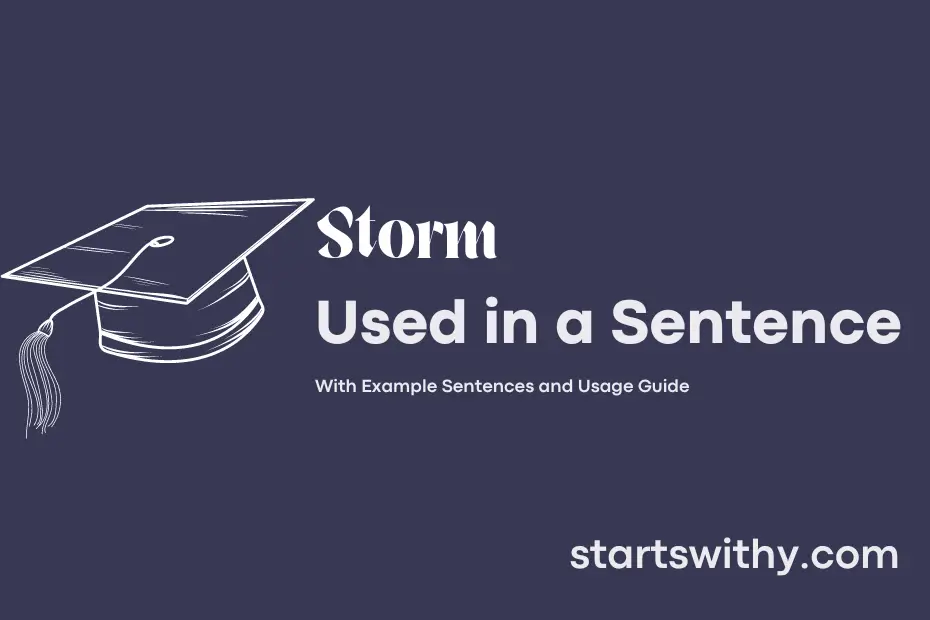Have you ever wondered how to use the word “storm” in different contexts? The term “storm” can refer to a tumultuous weather event, but it can also signify a strong outburst of emotions or a sudden burst of activity.
In writing, a “storm” can bring intensity and drama to a scene, creating tension and excitement for the reader. Understanding how to effectively incorporate the word “storm” in various situations can elevate your writing and evoke powerful imagery.
7 Examples Of Storm Used In a Sentence For Kids
- The storm made loud noises.
- The storm had strong winds.
- The storm brought rain and thunder.
- I saw a big storm in the sky.
- The storm came quickly.
- We stayed inside during the storm.
- The storm made the sky dark.
14 Sentences with Storm Examples
- Be prepared for the unexpected storm of assignments and project deadlines in college.
- The students scrambled to find shelter from the sudden storm that hit the campus.
- The power outage during the storm left many students struggling to complete their online classes.
- Despite the storm of exams approaching, the students maintained a positive attitude and studied diligently.
- The intense storm warning led to the cancellation of the college sports event.
- Many students decided to stay indoors and have a cozy movie night during the storm.
- The campus library was bustling with students seeking refuge from the storm outside.
- The strong winds of the storm caused damage to the college buildings, leading to temporary closures.
- The students bonded over their shared experience of enduring the challenging storm of final exams.
- The storm of emotions that came with adjusting to college life was overwhelming for some students.
- The storm of academic pressure caused many students to seek help from tutors and study groups.
- The campus was abuzz with chatter about the approaching storm and how to stay safe during it.
- The unexpected storm disrupted the college’s internet connection, causing frustration among students trying to submit assignments online.
- The students marveled at the beauty of nature’s power as they watched the storm pass over the campus.
How To Use Storm in Sentences?
Storm can be used as a noun or a verb in a sentence.
As a noun, storm refers to a violent disturbance of the atmosphere, with strong winds, rain, snow, or thunder. For example:
– The storm last night caused a lot of damage to the town.
– We should stay indoors during the storm.
As a verb, storm means to attack or assault something with great force or aggressiveness. For example:
– The protesters decided to storm the government building.
– He stormed out of the room in anger.
Additionally, storm can be used to describe intense emotions or actions in a figurative sense. For instance:
– She always storms into the room, full of energy.
– After hearing the bad news, he was storm with feelings of sadness.
When using storm in a sentence, it is important to understand the context in which it is being used to ensure clarity and accuracy. Whether describing a weather phenomenon, a physical action, or a metaphorical expression, the word storm adds intensity and dynamism to the sentence.
Conclusion
In conclusion, sentences with the keyword “storm” are used to describe the intensity, impact, and characteristics of turbulent weather conditions. They convey the sense of chaos, danger, and power associated with storms, painting a vivid picture of their destructive force. Whether talking about a violent thunderstorm approaching, a hurricane ripping through a city, or the aftermath of a powerful storm with its debris scattered everywhere, these sentences evoke a sense of urgency and awe.
Through phrases like “the storm clouds were brewing ominously” or “the furious winds howled through the night,” sentences with the keyword “storm” effectively communicate the dramatic and unpredictable nature of extreme weather events. They serve to capture the attention of readers, conveying the raw power and ferocity of nature’s wrath, leaving a lasting impact on the imagination of those who engage with such descriptions.



